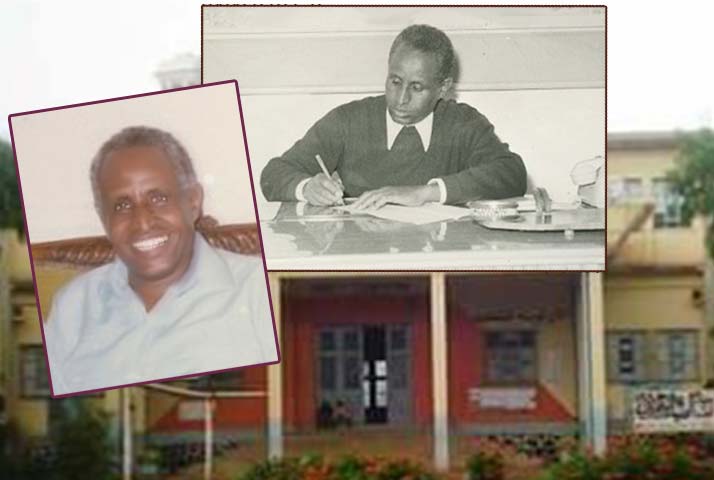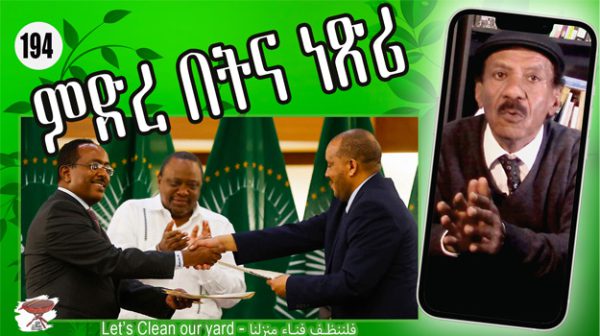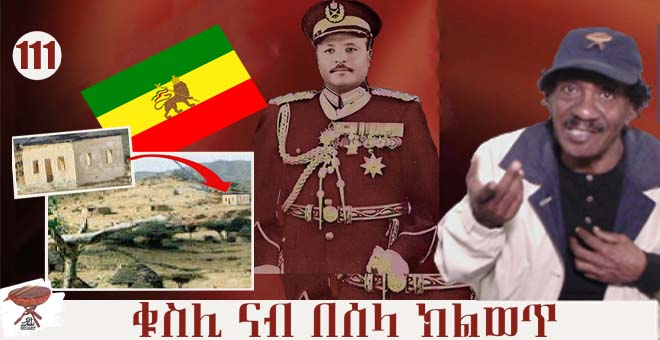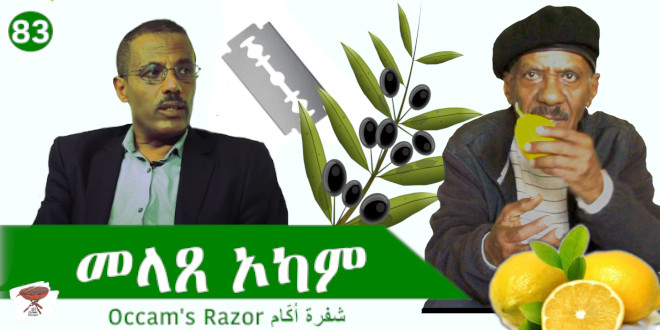The Torch Is Dead, Long Live the Torch

Fresh breeze came from the south carrying subtle smell of animal dung and wild flowers as a mother agonized delivering her second baby. She has been laboring for hours when finally the baby came into this world, the few women in the house let out sharp ululations, twelve times, a baby boy was born. The old woman, the midwife who walked all the seven kilometers from Adi Khuala to deliver the young mother felt relieved the baby came out alive; she smiled once more for the gift she expected from the father, maybe a milk sheep—she deserved it because she delivered a boy.
The father had just finished his fajr prayer and attentively listened as he spread his fingers to count the number of ululations. He was worried until he counted four ululations. Then he smiled, sure it was a boy; if it was a girl, they would have stopped at three. The woman ululated twelve times. A big smile sculpted on his face, he thanked God for the baby boy. AlHamdulilah, he sighed. He went out of his hut to the dawn light and saw his sister approaching, she had a big smile on her face. “Healthy boy and the mother is fine, she is all right,” his sister said.
His face still beaming with happiness, the father returned to his hut and began to pray a set of two postulations, thanking God.
The midwife had held the baby by his legs and slapped his back twice, he let out a sharp cry, then she immersed the baby in a bowl of warm water and washed him clean. Immediately she wrapped him in a clean gabi cloth and laid him by the side of the mother who was now relaxed after a difficult labor. Ululations didn’t stop, all the women in the forty-hut village came to congratulate the mother, men on their way to the field passed by and congratulated the father. They hastily sipped coffee from small ceramic cups and hurried on, smiling—one more farm hand was just born, good for the village of AdWedderki.
Ali Al Derki, Ad’Wedderki
The village had sprung out of a thick forest that disappeared years ago. All the huts in the valley were built of the forest trees that once covered the region. Scattered around, people had lived in the valley for hundreds of years, tribes moving on, settling in places, others moved away, leaving traces of their cultures, their cemeteries and breed of animals of different kind. It was there in the middle of the old forest that long time ago some people found a Sufi mystic living alone, in the shrubs, hunting and reciting, and praying. He has been there hidden from the sight of the people who lived in the valley until they discovered his existence.
They were impressed by his humility and dedication to prayer, and his simple life. “My name is Ali Al Derki,” he had told them. They saw him recite the Kuraan beautifully and discovered he was a learned man who shunned all worldly life. His ancestors had come from a far place, from Arabia, through Dahlak, and settled the shores of the Red Sea. The people of the valley trace their roots to the same place, and to the same people, the Below tribes that once ruled and flourished a big chunk of present day Eritrea. It was a small group of the Below that first settled the valley close to the Mereb river, and they are known as Enda Muaalim whose descendants are now part of the Jeberti nation.
When one morning they found Ali Al Derki, they discovered a common ancestry with him. They invited him to their huts, but he wouldn’t budge and refused to leave the calm forest, where he said his life was meant to be lived among its trees. In fact he was disappointed that the people found him. Dedicated to a mystic life, he wanted to be left alone, to his loneliness, but that was not possible anymore. He could have contemplated leaving the place in search of another secluded forest to live in. But he didn’t.
The people had begged him to teach their children the Kuraan, “God would approve of that!” they argued. Al Derki could not refuse but he had one condition: “the children have to come here to me, I don’t leave this place.” Fine, even if the place was secluded, many of the people passed close to it on their way to their fields or to the pastures to feed their cattle. It was the children who mostly tended to the herds anyway, they could take turns; some would study while others watched the herds. Better, they could just let the herd feed while they stayed on an elevated place and studied, under the guidance of Ali Al Derki.
The people of the valley decided: If Ali Al Derki wouldn’t come to us; we go to him. They came closer to Al Derki’s hideout and began to build some huts. The mystic Ali Al Derki loosened up and accepted a hut that the village built for him. In a short time, most of the people who lived in scattered huts across the valley built their huts close to Al Derki’s hut and a village sprung, they called it Ad Wed Derki, the village of Al Derki. In time it was further shortened, Ad’Wedderki—it was in this village that the baby boy was born.
His father had a name for him, it would be officiated on the seventh day. Mohammed Beshir, he called him on that winter day of 1932.
The Shepherd
Mohammed Beshir grew up in the village of Ad-Wed Derki, close to the family cattle, and he began to accompany the shepherds to the pastures at a very tender age. When he was seven, he was old enough to take care of the cattle alone. He felt like a man and his father wanted him to memorize the Kuraan; Mohammed beshir and a cousin Berhe Yehya took turns—one would attend Kuraan school while the other watched the cattle. They spent half the day watching the cattle and the other half memorizing the Kuraan.
Beshir would seldom go to Adi Khwala, the largest town in his small world though in reality, it was a sleepy one-street town. He had first come to the town crying after his favorite bull was slaughtered for the wedding of his older brother. He had cried and protested to no avail—he loved all the cows and he would feel down and sad whenever his father sold one of the animals. That time, the entire family couldn’t restrain the bull, it seems the bull felt it was his last day. They had to beg Mohammed Beshir to help them control the bull. Mohammed Beshir, tears flowing down his cheeks, went closer to the bull and rubbed his head affectionately. The bull that was uncontrollable moments earlier became timid and began to lick Mohammed Beshir’s legs. Mohammed Beshir put the ropes on the bulls legs and gave it to his elder brother. The moment his brother tightened the knot and with the help of three other men dropped the bull to the ground, Mohammed Beshir saw another man walking with a knife to slaughter the bull. Immediately he turned back and run away from the house crying. He didn’t stop until he reached Adi Khwala; he couldn’t bear the sight of his favorite bull being killed—he returned late at night. He always remembered that incident, “instead of being happy at my brother’s wedding, I wept for my bull,” he would say.
That same year Beshir began to feel restless, he couldn’t stand being close to the cattle that would be sold anyway. He despised the life of a shepherd and wanted to be an educated man. He saw a few of his relatives at Adi Khwala writing and reading newspapers. He was jealous of Haj AbdelHai who could write and recite poetry. He felt less of human because he was unable to read. He wanted to go to Egypt, Haj AbdelHai had told him there are a lot of schools there. He would have left that year but successive incidents were hindering his departure.
Devastation
One day, it had been raining all afternoon, Mohammed Beshir and Berhe Yahya, all wet and cold, were returning to the village, all the way making sure not to lose any of their animals. They had walked under the rain and reached close to their village when a lightening struck and killed Berhe. Mohammed Beshir was devastated and didn’t recover from the loss of his close friend for a long time. Again, a few months later, his father died and he had to help in taking care of the family. His dream of traveling to Egypt to seek education was becoming more difficult by the day. It was then that his older brother Sheikh Adem, his guardian, moved to Adi Khwala and opened a cloth and tailoring shop where Mohammed Beshir learned to weave traditional cotton clothes. He took that job as an opportunity and began to save enough money to pay for his planned journey to UmDurman in Sudan, from where he would travel to Egypt. He was twenty and had to get married, but he must have considered marriage a distraction. But family pressure forced him to get bugged in a marriage, in Adi Khwala.
Still, far from Egypt. Mohammed Beshir never gave up and kept his resolve alive, mentioning Egypt and education in any discussion he had. His friends laughed at his idea—they didn’t think Mohammed Beshir, who was over twenty and illiterate, would ever be a learned man. He smiled back at them with confidence. He knew that those who laugh last, laugh most.
He was twenty one when he bid everyone farewell and moved to Asmara; no one thought he would make it any further. But the determined Mohammed Beshir continued his way to Tessenei, smuggled himself across the Sudanese border to Kassala, and reached UmDurman where he knew no one. He met people at a mosque and they told him the money that he had was not enough to take him to Egypt—the imam of the mosque offered him a job: he worked as a Muazzin for eight months. Gradually he found a job as a cleaner in a health center in Umdurman, the city where he worked hard, day and night. Finally he saved enough. He hopped on buses, trains, trekked on foot through the desert and again, like he did when he entered Sudan, he smuggled himself into Egypt. The moment he arrived in Cairo, he asked for the direction to the AlAzhar university and told the people he wanted to enroll. Everyone laughed at him when they discovered he was illiterate. Some even mocked him: “you don’t even know how to hold a pencil!”
“Please teach me that as well!” Mohammed Beshir would calmly say.
His persistence gained him many sympathizers. His tenacity gained him many admirers. And his village innocence gained him many friends. They began to take him seriously, yet doubting that he could meet the challenges and manage to begin education at that age. Some of his new friends helped him apply at the adult education centers; others volunteered to give him private lessons. With a glisten in his eyes, he began to learn passionately. He started from elementary level, learning alphabets, and worked his way up, not caring for the mocking that came his way, and ignoring the many jokes the people cracked about him. He just kept smiling, and smiling. And learning.
Returning Home
In 1967 as the Arab Israeli War of 1967 came to an end, Mohammed Beshir was on a plane, heading back to Eritrea. He carried with him a university degree from Cairo University (Kuliat Dar Al Eloum). He stopped in Jeddah, Saudi Arabia; this time, no one laughed; but everyone who knew his story was stunned. Mohammed Beshir, the shepherd boy from Adi Wedderki, was returning to his village much bigger, carrying a university degree. He was a kind, smiling man; now he was a kind, smiling, soft-spoken and learned man. A selfless, dedicated and compassionate man. In Jeddah, his story became the talk of the Eritrean community. His presence in Saudi Arabia was for a purpose; he wanted to perform the Umrah ritual, a lesser Haj, in Mecca, before heading back home. But the people tried to persuade him to stay, “You will certainly get a good job in Jeddah,” they told him.
“No. I am going back home,” Mohammed Beshir said.
No one understood why an educated man, who could work and make good money in Saudi Arabia, would return to Eritrea, where he wouldn’t earn a fraction of what he would earn in Jeddah—that is if he ever finds a job in Eritrea. He just nodded his head implying that he understood what they meant, but he had made his choice.
“I lived a painful life, never forgetting that I was an illiterate person, I know there are many in Eritrea who carry that pain—I will help them ease that pain. I will help them learn and feel good about themselves. Not many understood his wild ideas.
Mohammed Beshir landed at Asmara airport in a sunny day; he prayed at the tarmac and kissed the ground. Those who knew him a shepherd, didn’t see him that way anymore; what they saw was not Mohammed Beshir, they saw inspiration and hope.
It didn’t take Mohammed Beshir much time before he disclosed his plans in full. He met with like-minded people and soon they embarked on an ambitious project: they would establish a private school. They did. It is Medresset AdDia’a (The Torch) located in Akhria, a large neighborhood of Asmara. The modest elementary school that started as three room project soon grew by bounds.
Today, one can travel to anywhere in the world where Eritreans reside and surely there would be professionals, business people and community leaders who went through Medresset Addia’a. All of them are indebted to Ustaz Mohammed Beshir; and all of them remember Mohammed Beshir with so much respect and admiration.
A Paralyzed Teacher
In 1990, Ustaz Mohammed Beshir had a stroke that left him half paralyzed. Still, with his half healthy body, he never stopped teaching.
In June of 1991, a few weeks after the liberation of Eritrea, I wanted to visit him. It was almost eight at night and I took a taxi to Akhria where I asked a shopkeeper for the direction to Ustaz Mohammed Behsir’s house. A twelve-year old child led me to his house through a bumpy narrow roads, two blocks away. Power was out that night in the area and we walked to the house in pitch darkness. We came to an unlocked door and pushed it; in the middle of the fence I saw a flickering light from a kerosene lantern. As I walked closer, I saw about a dozen children squatting on the ground and a man sitting on a chair in the middle. It was the first time I saw Ustaz mohammed Beshir and I waited for a while fearing I would interrupt him if I called for his attention. But then he saw me as he waved the children to go home. I didn’t think the classes has ended. I tried to hide my embarrassment for the interruption I caused, “no, it is the end of their class,” he said. I got closer, all the time wondering why he didn’t rise from the chair. It was then that I saw that one of his hands and a leg were not moving. It struck me, he was sick, I heard that; but no one told me he was paralyzed. No one told me such a sick and almost incapacitated man would bother to give night classes to the deprived children of the neighborhood. I felt like crying, but I resisted my tears and pretended I felt good. I talked to him for a while; but I had no idea I would not see him again. The idea of interviewing him, recording his voice, taking as much pictures as possible, never crossed my mind. I didn’t know then that I let go of a treasure trove that was in my hands. How many of us are not paying attention to such treasures that we can grab easily?
The Torch Is Dead, Long Live The Torch
On December 29, 2009, two days before the year ended, I received a call: Ustaz Mohammed Beshir passed away. He had carried the Torch, AdDia’a, for decades before the torch of his life died out.
Ustaz Mohammed Beshir was buried in Asmara where he had a crowded farewell that fitted him properly. May God have mercy on his pious soul.
NB: I have talked to many of Ustaz’s friends, contemporaries and relatives to compile this rather extremely short brief of Ustaz’s life history. In the process, I have learned that there are many unsung heroes who were close associates who were instrumental in establishing Medresset AlDia’a. I also learned of the many difficulties that Medresset AdDia’a is facing under the PFDJ regime; I avoided mentioning that since I wanted to focus on that because I considered this an eulogy to a great educator. If anyone has an anecdote, a close incident or experience with the late Ustaz Mohammed Beshir, or Medresset AdDia’a, please contact me. Thank you.




Awate Forum